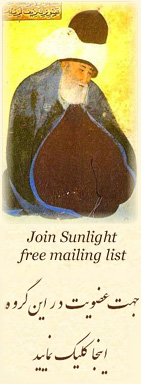If anyone has eloquence, a listener draws it out:
the teacher's enthusiasm and energy
are derived from the child he teaches.
When the harpist who plays twenty-four musical modes
finds no ear to listen, his harp becomes a burden:
no song comes to mind, his ten fingers will not function.
If there were no ears to receive the message from the Unseen,
no prophet would have brought a revelation from Heaven.
And if there were no eyes to see the works of God,
neither would the sky have revolved,
nor would the earth have smiled with fertile greenness.
The declaration lawlâka* means this,
that the whole business of creation
is for the sake of the perceiving eye
and the one who sees.
~ ~ ~ ~ ~ ~ ~ ~ ~
Jazb-e sam`ast ar kasi-râ khvosh labist
garmi o jedd-e mo`allem az sabist
Changiyi-râ ku navâzad bist o châr
chon niyâbad gush gardad chang bâr
Nah harâreh yâdesh âyad nah ghazal
nah dah angoshtesh be-jonbad dar `amal
Gar na-budi gush-hâ-ye Ghayb gir
vahy na-âvordi ze Gardun yek bashir
Var na-budi did-hâ-ye son` bin
nah falak gashti nah khandidi zamin
Ân dam-e lawlâka* in bâshad keh kâr
az barâ-ye cheshm-e tizast o nazzâr
*"But for you," referring to the Holy Tradition (hadith qudsi): "But
for you (O Muhammad) I would not have created the worlds."
-- Mathnawi: VI: 1656-1661
Version by Camille and Kabir Helminski
Rumi: Jewels of Remembrance
Threshold Books, 1996
Persian transliteration courtesy of Yahyá Monastra
The image:
http://tinyurl.com/k49jt
The Persian recitation:
http://tinyurl.com/qrpdm
A Persian interpretation:
http://tinyurl.com/gyb9c









No comments:
Post a Comment